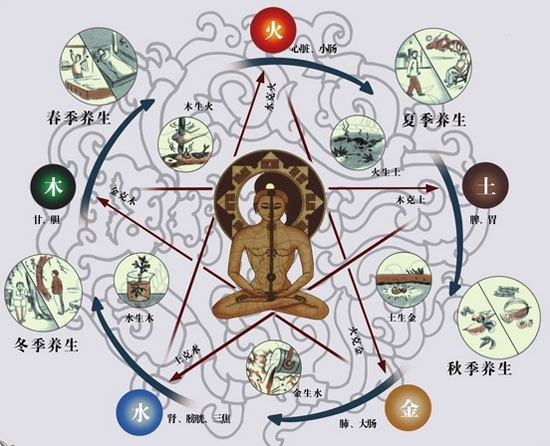The fu organs are the receptor organs. These hollow organs receive the fluids and energies from their zang counterparts. They receive, digest, absorb, and transmit nutrients and excrete wastes. They are considered yang relative to their paired zang organ. We can generalize and say that the fu organs transform and transmit. There are six fu organs: they are the Small Intestines, Stomach, Large Intestines, Urinary Bladder, Gall Bladder, and an interesting one called the "San Jiao," also known as the Triple Burner.
The Small Intestines
Paired with the Heart, the Small Intestines receive and store water and food. Just as we understand in the West, the Small Intestines are believed to digest food, convert it into nutrition, and send the unusable bits downward for excretion. A Chinese doctor would call the bits for excretion "turbid" and the nutritious bits "clear." If we are suffering from too much heat or too much dampness, problems may arise in our urinary system and turbidity will increase.
The Stomach
Paired with the Spleen, the Stomach receives and digests food. It also stores food and water. If Stomach Chi is weak, food stagnates and all manner of digestive problems arise.

The Large Intestine
Paired with the Lungs, the Large Intestines compact our solid wastes. Just as the Lungs' Chi energy controls water, the Large Intestines also affect water through the ability to absorb it. Too little absorption and we suffer loose bowels, too much and we become constipated.
The Urinary Bladder
Paired with the Kidneys, the Urinary Bladder stores and excretes urine. If there are problems with Kidney Chi, this may show up in urinary problems such as frequent micturition or the need to get up at night many times to urinate.
The Gall Bladder
Paired with the Liver, the Gall Bladder stores and excretes bile. In Chinese medicine, bile is considered to be Liver Chi, not the byproduct of the liver's digestion of fats, as we believe in the West. Together with the Liver, the Gall Bladder builds and controls the blood and our overall Chi levels. When weak, the Gall Bladder may cause us to be indecisive or hesitant. When strong, the Gall Bladder allows us to be decisive and bold.
The San Jiao
This organ has no Western counterpart. Sometimes referred to as the Triple Burner, this organ's function relates to digestion and elimination overall. There are many different views of what the San Jiao is exactly and what it does. It is often considered to have three separable functions:
-- the Upper Jiao, located above the diaphragm, distributes water in a mist form throughout the body, assisting the Heart and Lungs
-- the Middle Jiao, located between the diaphragm and the navel, assists the Stomach and Spleen with digestion and the transportation of nutrients
-- the Lower Jiao, located below the navel, assists the Kidneys and Urinary Bladder in their roles of elimination

![Diseases, Symptoms, tcm, [tcmwindow.com]](/uploadFile/adImg/2015/11/11/f5cbfcc0-4df5-4646-9b9a-f316651a0199.jpg)





